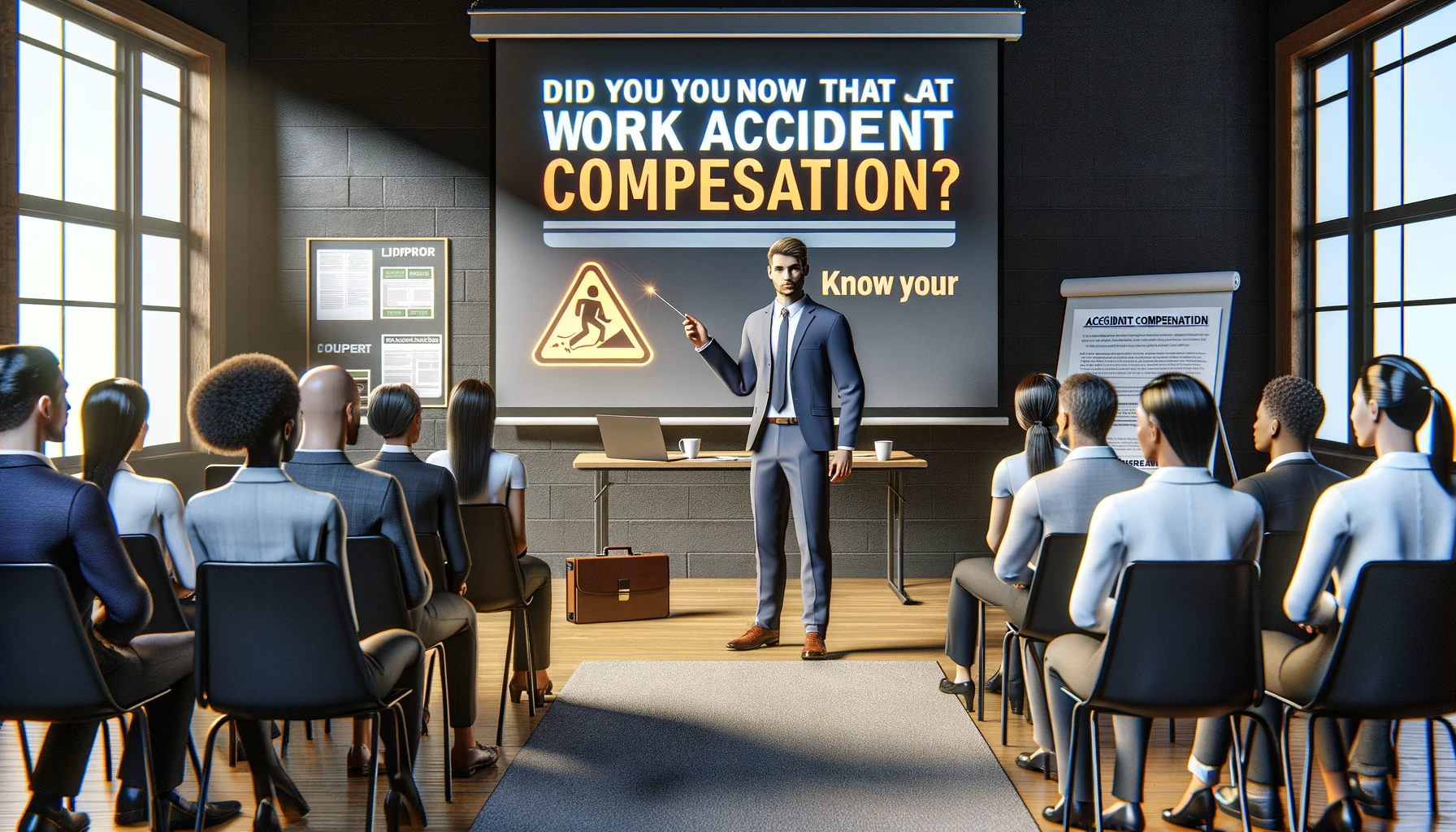Have you ever found yourself nursing an injury because of something that happened at work? It's not just the physical pain that stings, but the worry over medical bills and lost wages can be just as daunting. Thankfully, there's a silver lining: workplace injury claims. But where does one even begin? Let's dive into the world of employee compensation rights and find out how you can navigate these troubled waters.


What Are Workplace Injury Claims?
Imagine you're a tightrope walker; workplace injury claims are your safety net. They're legal provisions that allow you to receive compensation for injuries sustained while on the clock. Whether it's a slip, a fall, or something more serious, knowing what's covered is the first step to getting back on your feet. Workplace injury claims serve as a critical lifeline for employees who face the unfortunate event of being injured while performing their job duties. These claims are designed to provide financial support, medical coverage, and other benefits to help injured workers recover and maintain their livelihoods.Employee Compensation Rights
Every worker has rights, and they're not just words on paper. After a job-related mishap, you're entitled to seek compensation without fear of retaliation. Employee compensation rights are the cornerstone of a just and fair workplace. They ensure that when accidents happen, employees are protected and have the opportunity to receive the support they need to heal. Workplace safety regulations play a pivotal role in safeguarding the well-being of employees. These regulations set standards and guidelines for employers to create a safe and risk-free work environment. Employees can rest assured knowing that there are regulations in place to protect them from preventable workplace accidents.
Workers' Comp Benefits
Workers' compensation, often referred to as workers' comp, is like a trusty sidekick for the injured employee. It's a range of benefits, from covering medical expenses to providing disability pay, that you can access when you're hurt on the job. The primary purpose of workers' compensation is to ensure that injured workers receive timely and appropriate care, as well as financial support during their recovery. Understanding workers' comp benefits and how they work is crucial for employees facing work-related injuries. These benefits can include coverage for medical treatment, rehabilitation services, disability benefits, and even death benefits for the families of employees who lose their lives due to work-related incidents. Knowing how to navigate the workers' comp system is essential to accessing the support you need.Job-Related Accident Compensation
So, you've had a workplace tumble – what's next? First things first, report the incident. Promptly reporting a job-related accident is vital to initiate the compensation process. By documenting the details of the accident, you create a foundation for your compensation claim. Once the incident is reported, it's time to talk turkey: how much compensation can you get? The amount of compensation you may receive depends on various factors, including the severity of the injury, the circumstances of the accident, and your job role. It's essential to consult with a legal professional or workers' comp expert to ensure you receive fair and just compensation.Occupational Injury Recompense
Getting recompense for an occupational injury might feel like navigating a maze. But fear not; with the right map – in this case, knowledge of the claims process – you'll find your way to the treasure: fair compensation for your troubles. Occupational injuries encompass a wide range of conditions, from physical injuries caused by accidents to illnesses developed over time due to workplace conditions. Regardless of the nature of the injury, there are avenues for compensation and support available to injured workers.Industrial Accident Settlements
Sometimes, the path to compensation leads to a settlement. It's a bit like haggling at a market; only the stakes are higher. This is when having a savvy legal eagle by your side can make all the difference in getting a deal that's fair and square. Negotiating an industrial accident settlement can be complex. Both parties – the injured worker and the employer or their insurance company – seek to reach an agreement that serves their interests. Having legal representation ensures that your rights are protected, and you receive the compensation you deserve.Work Injury Reimbursement
If you're injured at work, reimbursement for your expenses is not just a nicety – it's a necessity. And that's where employer liability insurance comes into play. It's the pot of gold that ensures you're not left out of pocket for an accident that wasn't your fault. Employer liability insurance serves as a financial safety net for businesses and their employees. It covers the costs associated with workplace injuries, including medical bills, rehabilitation expenses, and potential legal fees. Employers are typically required to carry this insurance, ensuring that injured workers have access to the necessary resources to recover without facing financial hardship.On-The-Job Injury Claims
Filing a claim for an on-the-job injury is like putting together a puzzle; every piece of evidence matters. The key is to document everything meticulously – from medical reports to witness statements – because the more complete the picture, the stronger your claim. When pursuing an on-the-job injury claim, thorough documentation is your best ally. Gathering evidence, medical records, witness statements, and incident reports is essential to substantiating your case. The more comprehensive your documentation, the more compelling your claim becomes.Employer Liability Insurance
This is the shield that businesses carry to protect both themselves and their warriors (that's you, the employees). It's designed to cover the costs when accidents happen, so you can rest easy knowing there's a plan in place. Employer liability insurance, sometimes referred to as workers' compensation insurance, is a cornerstone of workplace protection. It not only safeguards employees but also shields employers from potentially crippling financial liability in the event of a workplace accident. Knowing that employer liability insurance is in place provides peace of mind to both parties, ensuring that injured employees receive the necessary support without burdening their employers.Workers' Compensation Process
Navigating the workers' compensation process can feel like you're in a labyrinth. But don't worry, you don't need a ball of thread; this guide will be your beacon, leading you through each twist and turn until you reach daylight. The workers' compensation process involves several stages, from the initial incident report to the resolution of your claim. It's essential to understand each step of the process to ensure a smooth journey toward recovery and compensation. Consulting with a workers' comp attorney or seeking guidance from HR professionals can help you navigate the complexities of this process.Reporting Work Accidents
Why shout from the rooftops when you've had a work accident? Because it's the law, and it's for your good. Not reporting can be like shooting yourself in the foot – you might miss out on the compensation you deserve. Reporting work accidents promptly is not just a legal requirement but a crucial step in securing your rights and accessing compensation. Failing to report an incident can have severe consequences, potentially jeopardizing your ability to receive the support and benefits you deserve. Reporting ensures that the incident is officially documented and can be investigated, which is essential for determining liability and compensation eligibility.
Occupational Hazard Lawsuits
When negotiations don't cut it, and you're facing a David vs. Goliath scenario, a lawsuit might be your slingshot. It's a big step, and the journey can be long, but for some, it's the road to justice. When workplace injury claims reach an impasse, pursuing an occupational hazard lawsuit becomes a viable option. While it's a significant step to take, it can be the path to achieving justice when all other avenues fall short. Occupational hazard lawsuits typically involve taking legal action against an employer or other parties responsible for the injury. This can be a complex and lengthy process, but for those seeking fair compensation and accountability, it's a necessary step to consider.Employee Insurance Claims
Making an insurance claim is like telling your story. You need to be clear, provide all the details, and make sure you're heard. Gather all the evidence you can, because the more thorough you are, the smoother the process will be. When it comes to employee insurance claims, thoroughness is key. Whether it's health insurance, disability insurance, or other coverage provided by your employer, you must communicate the details of your injury or illness. This includes documenting the circumstances, medical records, and any related expenses. Being comprehensive in your claim submission ensures that your insurance provider has all the necessary information to process your claim efficiently.Accident at Work Legal Advice
Sometimes, you need a guide through the legal jungle, and that's where professional advice comes in. A good lawyer is like a seasoned explorer, knowing all the paths and pitfalls to get you through safely. Navigating the legal complexities of workplace injury claims can be challenging, and that's where legal advice becomes invaluable. Consulting with an experienced attorney who specializes in workplace injury cases can make a significant difference in the outcome of your claim. These legal experts understand the intricacies of the law and can guide you through the process, from negotiating with insurance companies to representing you in court if necessary. Their expertise ensures that you have a strong advocate on your side.Work-Related Injury Insurance
Understanding your work-related injury insurance is crucial. It's the difference between thinking you're covered for a sprained ankle at the company picnic and being covered. Know your policy inside out – it's your financial first-aid kit. Your work-related injury insurance policy is your safety net in times of need. It's essential to have a thorough understanding of the coverage it provides. This includes knowing the extent of medical expenses covered, disability benefits, and any other financial support available. Familiarizing yourself with the policy's terms and conditions ensures that you're prepared for unexpected accidents or illnesses that may occur in the workplace.Compensation for Injured Workers
Compensation comes in many shapes and sizes: from lump sums to ongoing payments. It's important to know what you're entitled to so you can claim every last dime. After all, it's your health on the line. Workplace injury compensation can take various forms, and it's crucial to be aware of your entitlements. Compensation may include lump-sum settlements, ongoing payments to cover medical expenses and lost wages, or even vocational rehabilitation services to help you return to work. Understanding the full scope of compensation options ensures that you receive every benefit you're entitled to, supporting your recovery and financial stability.Workplace Accident Compensation Claims
Filing a workplace accident compensation claim is your right, but it's also a process that demands attention to detail. Skip a step or miss a deadline, and you could trip at the final hurdle. The process of filing a workplace accident compensation claim can be intricate. It requires careful attention to detail, including documenting the incident, notifying your employer, and adhering to specific timelines. Missing a step or failing to meet deadlines can jeopardize your claim. Therefore, it's essential to follow the prescribed procedures diligently to ensure a successful claim.Employee Accident Compensation Process
The employee accident compensation process is a marathon, not a sprint. From the moment you're injured to the final settlement, there are stages to clear and hoops to jump through. Patience and persistence are your running mates here. Patience is a virtue when it comes to the employee accident compensation process. It's not a swift journey but rather a series of steps, evaluations, and negotiations. From the initial report of the incident to the final settlement, each stage requires time and effort. Staying persistent and following through with the necessary actions is essential to navigate the process successfully and secure the compensation you deserve.Claiming Compensation for Work Accidents
In the end, claiming compensation for work accidents is about standing up for yourself. It's about making sure that when you're down, you're not out. So, arm yourself with knowledge, and don't be afraid to fight for what you're owed. Claiming compensation for work accidents is not just a financial matter; it's about asserting your rights and ensuring that you receive the support you need to recover. Knowledge is your most potent weapon in this process. By understanding your rights, the available avenues for compensation, and the steps involved, you empower yourself to stand up for your well-being and financial security. Don't hesitate to advocate for what you're owed.Conclusion
Navigating the world of work accident compensation can be daunting, but it's not a journey you have to take alone. Remember, knowledge is power – the more you know about your rights and the process, the better equipped you'll be to claim what's rightfully yours. So take a deep breath, and take those first steps towards compensation. You've got this! In conclusion, workplace injury claims, employee compensation rights, workers' comp benefits, and the entire process of seeking compensation for work-related injuries are essential aspects of ensuring that employees are protected and supported in the event of accidents or illnesses. Understanding the various elements involved, from insurance claims to legal assistance, empowers individuals to navigate these challenges successfully.Look for an attorney who has the right legal resources for your legal needs.
Contact us here on the Warmuth Law website or through our hotline 888-517-9888.










